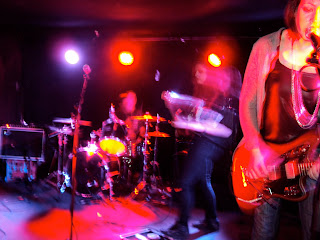ZOND are an enigmatic entity. It’s likely that most people who don’t live in Melbourne or Sydney haven’t had the benefit of seeing them, and are probably less aware of their existence than they should be. There is little information about them at the moment; whether their low-profile is a conscious move or not, it does add an air of mystery that complements their aesthetics quite suitably.
The band seems to have surfaced around 2006, after On released a self-titled album on Saucerlike Recordings and dissolved. As Zond, three of the On members (Marney Macleod, Justin K Fuller, Tym Krasevac) and Mark Nelson of The Stabs recorded a split 12” with Hi-God People on Spanish Magic. That record sounds vastly different from their current phase, but until now was the only available documentation. Subsequently, Stephen J Thomas replaced Nelson on bass, and a self-titled full length was recorded and mixed with Jack Farley over 2008-09.
The CD was released a year later on R.I.P. Society in May 2010 and the LP a few months later The band’s lineup changed at least twice over that time, with the addition of Harriet K Morgan playing 80's Casio synths and guitar. Earlier this year, Thomas left the band, Morgan took up bass, and Matthew Brown joined with a Korg MS-20.

Zond
R.I.P Society Records, 2010
The Zond LP was something I had been waiting to hear since seeing them for the first time last year. They have created a truly unique conglomerate of noisy, aggressive experimental rock that still manages to allow space for deeply resonant and affecting melodic ideas. The first trace of familiarity that I encountered here was shoegaze, but the undercurrent of darkness and emphasis on unbridled power in their music makes this label seem like a discredit to them. I could waste a lot of words trying to describe their sound via other reference points, but reducing them to one genre is unjust and seemingly impossible to do so accurately. There is a foreign, slightly frightening otherworldliness to this album that defies easy classification.
These tracks travel between the extremes of far-out instrumental excursions and (more) conventional songs, which are kept vaguely elusive due to buried vocals that creep in and out of the noise in a weird, ghostlike way. Words drift by, existing only momentarily before they disappear again, messing with the listener’s perceptiveness. The thick swarm of noise that surrounds you is the combined discharge of several guitars, synthesizers and bass, blurred together through absurd volume. This onslaught causes fleeting lapses in the ability to distinguish what’s actually happening, and this is a good thing: its surreally disorienting.
Best experienced on headphones turned way up, the songs have this enormous sense of depth. Layers of noise are unleashed gradually and intelligently, so an already thunderous portion of a song can escalate into new heights of crushing intensity. Despite this, listening to it while on the verge of sleep is actually relaxing, and being awoken after an intervallic lull can be alarming, confusing… fun.
The dense, screaming mess of guitars and restless drumming create a precarious looseness that seems to warp their collective rhythm, but in an oddly unified way… a mutual idiosyncrasy developed naturally over time. While the awesome production definitely contributes to the album’s colossal power, it doesn’t misrepresent their live experience.
There’s something happening here that transcends the normal ‘loud + noisy’ band aesthetic, its a little cerebral and more organic. Sure they’re heavy, but they don’t make a contrived fuss about it that smacks of transparency, or a cringe-inducing, over-inflated self-assuredness seen too often in pseudo-doom bands that take themselves too seriously. Instead, Zond wield all this immense volume and violence yet look and sound like they’re on the brink of being swallowed up by their own chaos. Bands this good only exist through an uncompromising commitment to their sound, and a heightened understanding of both their instruments and the music that influences how they play them. This band is undeniably distinctive, exciting, and vital.
 .
.





